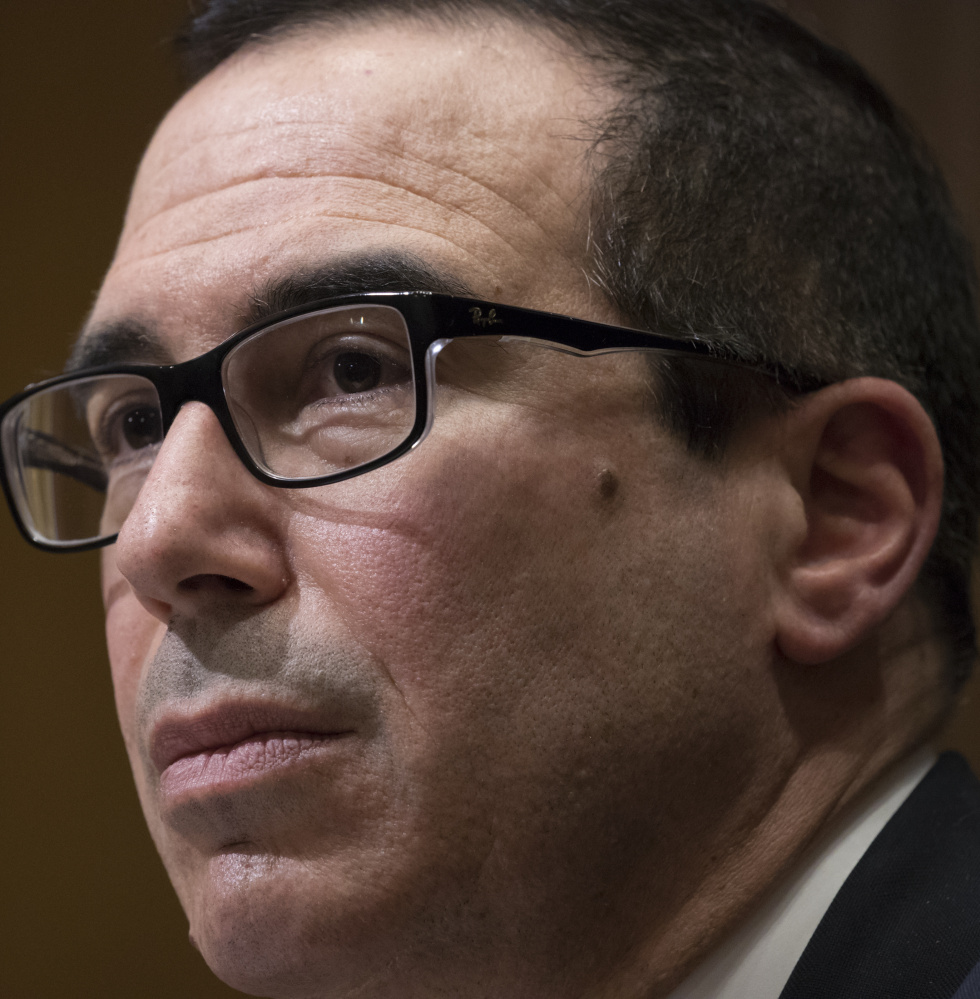A woman at the center of a foreclosure robo-signing scandal at OneWest Bank in 2009 – and now part of the controversial confirmation hearings for a new Treasury secretary – signed off on mortgage documents in Maine.
The scandal is attracting new attention because Steven Mnuchin, President Trump’s nominee to head the Treasury Department, denied in a Senate confirmation hearing that OneWest, the bank that he headed from 2009 to 2015, engaged in robo-signing. Critics of Mnuchin are hoping that the controversy over robo-signing, along with allegations that the nominee hasn’t revealed all his financial records, might derail his nomination.
A Senate committee voted last week in favor of Mnuchin’s confirmation after Democratic members of the panel boycotted the vote. A vote by the full Senate is expected this week.
Robo-signing is the practice of signing off on foreclosure documents, in some cases hundreds or thousands of them at a time, without reviewing the underlying papers. It was often employed by banks at the height of the foreclosure crisis in 2009 and 2010 to speed up the foreclosure process, particularly in states like Maine, where foreclosures need to be approved by a court.
Having all the documents assembled and their accuracy attested to allowed some lenders to get courts to issue summary judgments in the foreclosures, meaning the bank could take possession of the property without the time and expense of a full trial.
Bank officials signed foreclosure documents to swear that they had reviewed the mortgage documents, confirmed that a homeowner was seriously delinquent on payments and affirmed that all the pertinent records were accurate and attached to the foreclosure suit. The practice of signing the documents without doing that was uncovered by Thomas Cox, a Portland lawyer working with Pine Tree Legal Assistance, who showed that an official with mortgage lender GMAC never reviewed the mortgage information before pushing ahead with foreclosure proceedings.
In the OneWest case, a bank vice president named Erica A. Johnson-Seck testified in a 2009 deposition that she often signed more than 750 foreclosure affidavits a week and even changed her signature to a hastily scrawled “E” so she could sign the documents more quickly, typically in less than 30 seconds. She also said that she didn’t review the underlying documents and that a witness and notary who also signed the documents did not actually see her sign the papers as they were supposed to do.
In Maine, Johnson-Seck’s “E” shows up on dozens of mortgage assignments in 2009 and 2010, when mortgages were shifted from IndyMac, the failed mortgage company that Mnuchin and others bought in 2009, to OneWest, the new name for the company after its sale by federal regulators.
Cox said about 40 percent to the assignments signed by Johnson-Seck were filed in Maine during a short period in July 2009, and don’t appear linked to foreclosures. But he said the rest signed by her seemed linked to subsequent foreclosures – the mortgages had to be shifted to OneWest before bank officials could seek to foreclose on the homes. In some cases, the foreclosure complaint was filed the same day as the mortgage assignment or within a week or two after, he said.
Foreclosure court records for 2009 and 2010 have been moved into storage in most Maine courthouses and it would take at least a week to retrieve them, so it could not be immediately determined if Johnson-Seck signed off on the affidavits for the foreclosures or if another OneWest bank official signed the affidavits.
IndyMac and OneWest foreclosed on 74 homes in Maine from 2008 to 2015, according to Attom Data Solutions, which tracks the real estate and mortgage markets. There were 3,502 foreclosures in Maine in 2010, at the height of the crisis, but by 2015, that number had fallen to 806, according to RealtyTrac.
One West has been criticized for its tough collection practices and a group opposed to Mnuchin’s appointment said the information on robo-signing contradicts the nominee’s statements on how his bank handled mortgages during the financial crisis.
“Steve Mnuchin said his bank did not robo-sign. Now we have yet another round of evidence that it did,” said Lisa Donner, executive director of Americans for Financial Reform. “The public deserves clear answers, and all senators should be demanding them. We do not need, and they should not support, a Treasury Secretary who thinks the rules do not apply to himself or to his partners on Wall Street.”
Edward D. Murphy can be contacted at 791-6465 or at:
emurphy@pressherald.com
Send questions/comments to the editors.




Comments are no longer available on this story